|
|
|
Sort Order |
|
|
|
Items / Page
|
|
|
|
|
|
|
| Srl | Item |
| 1 |
ID:
130237
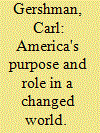

|
|
|
|
|
| Publication |
2014.
|
| Summary/Abstract |
Public opinion reports on Americans' attitudes toward foreign policy sketch a picture of retrenchment, war-weariness, and skepticism toward global engagement, even as there is also a growing concern that the world is increasingly unstable and dangerous. Nothing about this picture is new or controversial. Some may worry about it more than others, but it is now commonly accepted that the US is downsizing its international role, and that the administration, the Congress, and the general public are more absorbed with domestic concerns than with foreign challenges or threats.
|
|
|
|
|
|
|
|
|
|
|
|
|
|
|
|
| 2 |
ID:
130238
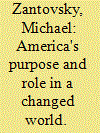

|
|
|
|
|
| Publication |
2014.
|
| Summary/Abstract |
It is not a new observation that, just as the twentieth century started late, with the shots in Sarajevo, so did the twenty-first century, with the September 11th attacks. Compared to the conflagration that followed the first event, whose centennial this year is a welcome opportunity for some belated soul-searching, the bloodshed that started with the second event has been limited, but its consequences may have been just as profound. The two American administrations that inherited the post-September 11th world have since struggled, along with the rest of the world, with the consequences. One chose to confront the evil head-on, in order to eradicate its sources and deter its repetition, with mixed results. The other largely opted for seeing and hearing little evil, with results that the jury is still out considering.
|
|
|
|
|
|
|
|
|
|
|
|
|
|
|
|
| 3 |
ID:
130240
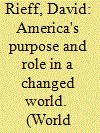

|
|
|
|
|
| Publication |
2014.
|
| Summary/Abstract |
Let me begin by putting my own moral and ideological cards on the table, since I assume that I have been asked to participate in this symposium because of, and not in spite of, the fact that I reject the idea that America's global hegemony is not just good for the United States but assures global peace and stability as well, and thus is good for the world. In his recent book-length article for a special issue of the New Left Review titled "American Foreign Policy and Its Thinkers," a brilliant, implacable anatomization of the American Empire, Perry Anderson approvingly quotes Christopher Layne's observation that "in international relations, benevolent hegemons are like unicorns-there is no such animal." That is certainly my view. And I would add that a democratic empire (for other than its own citizens, at least) is quite simply a contradiction in terms.
|
|
|
|
|
|
|
|
|
|
|
|
|
|
|
|
| 4 |
ID:
130243
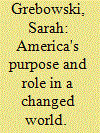

|
|
|
|
|
| Publication |
2014.
|
| Summary/Abstract |
I'll never forget my brief and ill-received show of American patriotism as a young expatriate in Beirut. It was the summer of 2010, and the city was teeming with convoys of Lebanese youth honking and waving flags to celebrate their favorite teams' victories in the World Cup. After an exciting win by the US, I joined a group of Americans in a street celebration. But cruising down the main thoroughfare of West Beirut, our procession of stars and stripes was met with disapproving looks. The image that remains with me to this day is that of an older man standing silently with his shoe in his hand. The tattered sole was pointed directly at us, an expression of disrespect in Muslim culture. We recognized the gesture's meaning only because a similar shoe had been thrown at the American president's head a year earlier.
Today's generation of young Americans, known as the millennials, has come of age at a time when America has been humbled on the world stage. Many of them have traveled extensively at a young age and experienced this diminished reputation firsthand. Their parents and grandparents believe that America has been a remarkable force for good in the world and that the country should not lose sight of its responsibility to shape events globally because of mistakes made in the last decade. But millennials seem more fixed on the limits of American power and disenchanted with ideas of American exceptionalism.
Because of these reservations, the millennial generation is often described as declinist or isolationist. I disagree. Young Americans care more than any other age group about what happens beyond our borders. Millennials tend toward multilateralism and the cautious use of force, and perhaps would be more selective in committing US resources overseas. But far from an abdication of global leadership, this prudence may prove to be the silver lining to millennials' crisis of confidence in America's role as, in President Obama's words, "not just a place on a map, but the light to the world."
|
|
|
|
|
|
|
|
|
|
|
|
|
|
|
|
| 5 |
ID:
124766
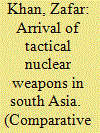

|
|
|
|
|
| Publication |
2013.
|
| Summary/Abstract |
This article examines the arrival of Tactical Nuclear Weapons (TNWs) amid the rapid arms race in South Asia. It analyzes the stability and instability prospects linked to the arrival of and dependence on TNWs. It states that TNW is a murky term that confronts a definitional issue. Although TNW has not been used yet, it entails the risk of its use on the battlefield in the event of a limited war. Conceptually, this sets the stage for an interesting debate on whether or not the arrival of TNWs is stabilizing for the South Asian region, which has confronted many wars and minor border skirmishes during pre- and post-nuclear periods. Since it is viewed that a possible limited military escalation to a nuclear level may not be ruled out and the arrival of TNWs has become a reality, the article concludes that a centralized command and control system bolstered with the non-deployed deterring posture of TNWs is the immediate solution to avert the related worries of pre-delegation, force protection, and the use-or-lose dilemma. It is expected that, learning from their nuclear predecessors, the South Asian nuclear leadership would practice restraint, remain rational, and call for the need of political trust and military reassurances to avert nuclear weapon use.
|
|
|
|
|
|
|
|
|
|
|
|
|
|
|
|
| 6 |
ID:
162793
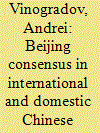

|
|
|
|
|
| Summary/Abstract |
This article examines the approaches of foreign researchers to the model of the Beijing Consensus formulated in 2004 by Joshua Cooper Ramo, including those of members of different Chinese schools of thought. We analyze the question is analyzed of whether China, in promoting the ideas of globalization, is ready to propose a realistic alternative to the Washington Consensus, or to reproduce the successful experience of its own development in other developing countries. The model of the Beijing Consensus is examined in the context of the change in global leadership.
|
|
|
|
|
|
|
|
|
|
|
|
|
|
|
|
| 7 |
ID:
100617
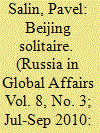

|
|
|
| 8 |
ID:
131882
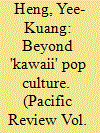

|
|
|
|
|
| Publication |
2014.
|
| Summary/Abstract |
Many studies of Japan's soft power are premised on the 'affective' dimensions of its kawaii pop culture that generate liking or interest. While entirely warranted, emphasising cultural attraction does not do sufficient justice to the multi-faceted foundations of Japanese soft power. Neither does it recognise other components of Joseph Nye's soft power framework stressing the 'normative' appeal of policies that reflect global norms. This article investigates the 'normative' dimensions of Japan's soft power on climate change, and whether it translates into international influence, as Nye predicted. The first section examines the Cabinet's 2010 New Growth Strategy, identifying a potential source of 'normative' soft power in its self-proclaimed desire to reinvent Japan as a 'trouble-shooting nation on global issues', specifically environmental challenges. Next, it analyses how Japanese entities (government, corporations, and NGOs) can transmit 'normative' soft power, and obstacles encountered. These transmission mechanisms include 'Cool Earth Partnership' programmes, the 'Future City Initiative' and the values-based Satoyama Initiative. The final section addresses conceptual implications that arise, and assesses whether Japan's 'normative' soft power has paid dividends. Drawing from literature on pioneer states and external reviews of Japan's alignment with key climate norms, the paper suggests that Japan's normative soft power is lacking in driving agendas at global climate forums. At a pragmatic problem-solving level, however, Japan is increasingly perceived as an attractive source of transferable solutions, reflecting climate norms such as developing eco-friendly technologies and providing assistance to help vulnerable countries mitigate climate change
|
|
|
|
|
|
|
|
|
|
|
|
|
|
|
|
| 9 |
ID:
119925
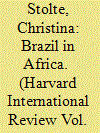

|
|
|
|
|
| Publication |
2012.
|
| Summary/Abstract |
In the shadow of China's and India's inroads into the African continent, South America's emerging power, Brazil, has been increasing its presence in Africa. However, its role in Africa has remained relatively unnoticed by international media and academia thus far. Brazil's low visibility in Africa cannot be explained exclusively by the fact that its financial engagement is still limited in comparison to that of China or India. An explanation would also need to include the unique way the South American power has interacted with Africa. Brazil has presented itself as a partner for Africa's development challenges rather than as a business partner. Although Brazil primarily imports oil and other natural resources from Africa, Brazil's cooperation with African countries, in contrast to that of China or India, has not been tied to contracts for oil-drilling or mining concessions. In fact, Brazil's expanding engagement in Africa serves other motives than resource-seeking. Brazil is trying to gain status as a global player by acting as a provider of development assistance and demonstrating global leadership on pressing international issues such as poverty alleviation, the fight against AIDS, or the provision of energy security.
|
|
|
|
|
|
|
|
|
|
|
|
|
|
|
|
| 10 |
ID:
127600
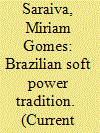

|
|
|
|
|
| Publication |
2014.
|
| Summary/Abstract |
Over the past decade, amid growing international fragmentation and declining US hegemony, Brazil has assertively expanded its participation in multilateral forums as part of a diplomatic strategy that envisions a reformulation of international institutions. At the same time, Brazil has also worked on building a leadership role within South America. These global and regional aims continue to shape the country's use of soft power. Indeed, soft power-defined by the political scientist Joseph S. Nye Jr. as influencing the behavior of others via attraction or persuasion rather than coercion or payment-is nothing new in Brazil's international dealings. Since the early 1900s, the nation has used such a strategy under different labels in conjunction with two beliefs central to its foreign policy: the need to build and assure Brazil's autonomy in its development strategy and foreign policy choices, and the desire to raise its global political profile
|
|
|
|
|
|
|
|
|
|
|
|
|
|
|
|
| 11 |
ID:
127558
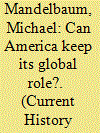

|
|
|
|
|
| Publication |
2014.
|
| Summary/Abstract |
Almost one hundred years ago events took place that propelled the United States on the path to the global role it plays today. World War I drew the country from the edge of international politics to the center. In 1917 America entered the war, dispatching troops to the European continent for the first time in its history. The United States withdrew from the security affairs of the continent during the interwar period, but returned in World War II, playing a larger role in Europe than in the previous conflict while simultaneously waging another major war, against Japan, in the Pacific.
|
|
|
|
|
|
|
|
|
|
|
|
|
|
|
|
| 12 |
ID:
147120
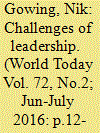

|
|
|
| 13 |
ID:
161577
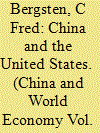

|
|
|
|
|
| Summary/Abstract |
This paper considers whether there is a “Thucydides trap” in the world economy, referring to the inherent conflict between incumbent and challenger. It assesses the impact of President Trump's alienation of traditional US allies, which threatens to splinter the “hegemonic coalition” and even push China and Europe together, and his convergence toward some Chinese norms on trade and even politics. It outlines three possible systemic scenarios: a “G0” in which the US is no longer willing to lead but China is not yet able or willing, and whether such a (likely) regime will be stable or unstable; a new “G1,” sooner or later, led by China; and a cooperative “G2” in which the US and China agree to share leadership. It traces the evolution of actual leadership initiatives of the two countries in recent years. It compares US and Chinese attitudes on key systemic issues and concludes with an appraisal of “an international economic order with Chinese characteristics,” a world in which the state plays a greater role relative to market economics, the rule of law defers increasingly to voluntary arrangements, and politics tilt toward central government control more than democracy.
|
|
|
|
|
|
|
|
|
|
|
|
|
|
|
|
| 14 |
ID:
146269
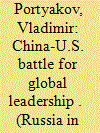

|
|
|
|
|
| Summary/Abstract |
When China caught up with Japan in terms of GDP in 2010, that fact attracted worldwide attention and sparked numerous responses and comments from the international media. Meanwhile, another event, probably just as important, which took place a few years later, has remained almost unnoticed.
|
|
|
|
|
|
|
|
|
|
|
|
|
|
|
|
| 15 |
ID:
129642
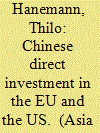

|
|
|
|
|
| Publication |
2014.
|
| Summary/Abstract |
Chinese outward foreign direct investment (OFDI) in developed economies has increased substantially in recent years, driven by policy liberalization and structural adjustments in China's economy. Efforts to accurately describe the dimensions of this increase are complicated by problems with official statistics and the complexity of deal structures. This article introduces the major problems of capturing data on global cross-border investment flows and elaborates on the particular difficulties of measuring Chinese outward FDI. It identifies alternative datasets that can help to better capture the scope and patterns of the Chinese overseas investment and uses one of them to describe the growth of Chinese investment in the EU and the US since 2000, highlighting similarities and differences in investment patterns in the world's two biggest economies.
|
|
|
|
|
|
|
|
|
|
|
|
|
|
|
|
| 16 |
ID:
110460
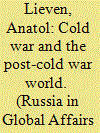

|
|
|
|
|
| Publication |
2011.
|
| Summary/Abstract |
Rather than a future in which Chinese hegemony will replace that of the United States, we seem to be rapidly entering a world in which no country will exercise anything resembling true world leadership. This bears a sinister resemblance to the 1920s, when the United States replaced Britain as the world's leading economic power, but was wholly unwilling to shoulder additional burdens of global leadership.
|
|
|
|
|
|
|
|
|
|
|
|
|
|
|
|
| 17 |
ID:
197501


|
|
|
|
|
| Summary/Abstract |
Defining Canada's foreign policy has always been a conundrum for Canadian decision makers, torn between the desire to carve out a space of Canada's own, while recognizing the benefit and necessity of ties with the US. Today, this job has become much more difficult because America's global leadership role is changing in ways that are difficult to predict, but that will inevitably make it harder for Canada to navigate internationally. Canada has no choice but to develop greater strategic sovereignty. What Canada needs now, nineteen years after the last foreign policy review, is a national conversation about Canada's role in the world. The goal should be to encourage a sense of shared national purpose and craft a renewed foreign policy for an uncertain world. To do so, Canadian decision makers should ask five core questions: first, how should Canada's foreign policy prioritize Canadian values with ‘more pragmatism and less posturing'? Second, what balance should we seek between Canada's global role and its bilateral focus on the US? Third, how can we mitigate the risk to Canada of a more inward-looking, protectionist and unpredictable US? How should we adapt Canada's international engagement to take into account a less globally-engaged US? Finally, what specific Canadian interests, assets and vulnerabilities should our foreign policy prioritize? The article offers a framework for Canada to set about rebuilding its strategic sovereignty, launching a national conversation to rethink and rewrite its foreign policy narrative, redefine its international priorities and create a sense of common purpose around Canada’s role as a global actor.
|
|
|
|
|
|
|
|
|
|
|
|
|
|
|
|
| 18 |
ID:
117446


|
|
|
|
|
| Publication |
2012.
|
| Summary/Abstract |
After sixty-five years of pursuing a grand strategy of global leadership-nearly a third of which transpired without a peer great power rival-has the time come for the United States to switch to a strategy of retrenchment? According to most security studies scholars who write on the future of U.S. grand strategy, the answer is an unambiguous yes: they argue that the United States should curtail or eliminate its overseas military presence, abolish or dramatically reduce its global security commitments, and minimize or eschew efforts to foster and lead the liberal institutional order. Thus far, the arguments for retrenchment have gone largely unanswered by international relations scholars. An evaluation of these arguments requires a systematic analysis that directly assesses the core claim of retrenchment advocates that the current "deep engagement" grand strategy is not in the national interests of the United States. This analysis shows that advocates of retrenchment radically overestimate the costs of deep engagement and underestimate its benefits. We conclude that the fundamental choice to retain a grand strategy of deep engagement after the Cold War is just what the preponderance of international relations scholarship would expect a rational, self-interested leading power in America's position to do.
|
|
|
|
|
|
|
|
|
|
|
|
|
|
|
|
| 19 |
ID:
124761
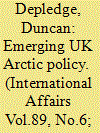

|
|
|
|
|
| Publication |
2013.
|
| Summary/Abstract |
How is the United Kingdom engaging with changing geopolitics of the Arctic in the twenty-first century? This article considers the UK's contemporary interest(s) in the Arctic at a time of unprecedented change in the northern latitudes of our planet. In particular, it focuses on the ongoing emergence of UK Arctic policy as an assemblage of processes involving various actors-government officials, scientists and other academics, environmental campaigners, journalists and the private sector-which not only define UK interests but also delimit what the term 'Arctic' means to, and demands of, the UK. The focus of the article is directed at the recent activities by the Ministry of Defence, the House of Commons Environmental Audit Committee and the related work of the Foreign and Commonwealth Office to develop an Arctic Policy Framework, drawing on official government documents and a series of interviews conducted between 2010 and 2013 for evidence. The article concludes with the author's thoughts on tensions and contradictions that remain in the UK's policy towards the Arctic and the implications this might have at a time when global interest in the Arctic is growing rapidly.
|
|
|
|
|
|
|
|
|
|
|
|
|
|
|
|
| 20 |
ID:
108945
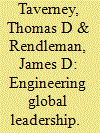

|
|
|
|
|
| Publication |
2011.
|
| Summary/Abstract |
The economic greatness that the United States achieved in the last half of the twentieth century was not assured at the end of World War II. The ascension and U.S. economic juggernaut was secured by three seminal events: (1) the passage of the G.I. Bill; (2) the Soviets' Sputnik launch and the start of the Space Age; and (3) John F. Kennedy's challenge to go to the moon and the subsequent Moon Race. These events spurred the United States to seize and retain leadership in space technology development and space activities; the nation invested in education systems and students, and encouraged a competition that brought out the best from its engineers and scientists and inspired important efforts. The resulting technical genius has fostered advances in a wide variety of other technologies, improving the nation's quality of life. The United States now faces a difficult road ahead unless something is done to reverse recent downward trends in science, technology, engineering, and math education. The authors ask: where is our next G.I. Bill, Sputnik, or Moon Race?
|
|
|
|
|
|
|
|
|
|
|
|
|
|
|
|
|
|
|
|
|